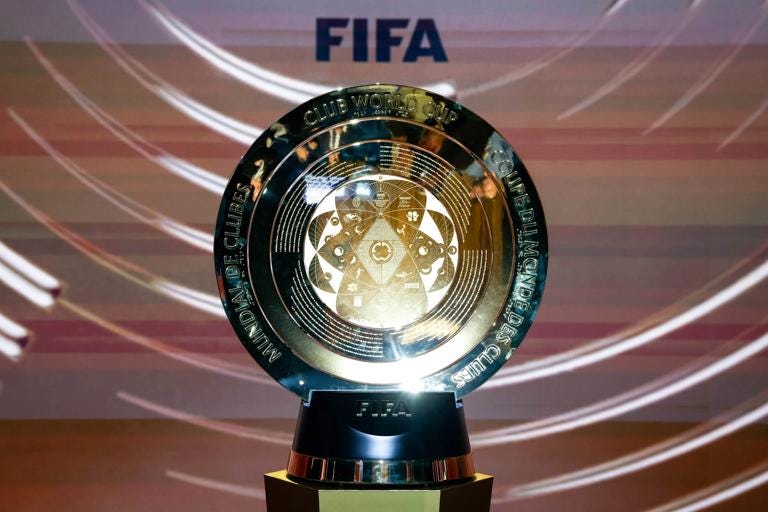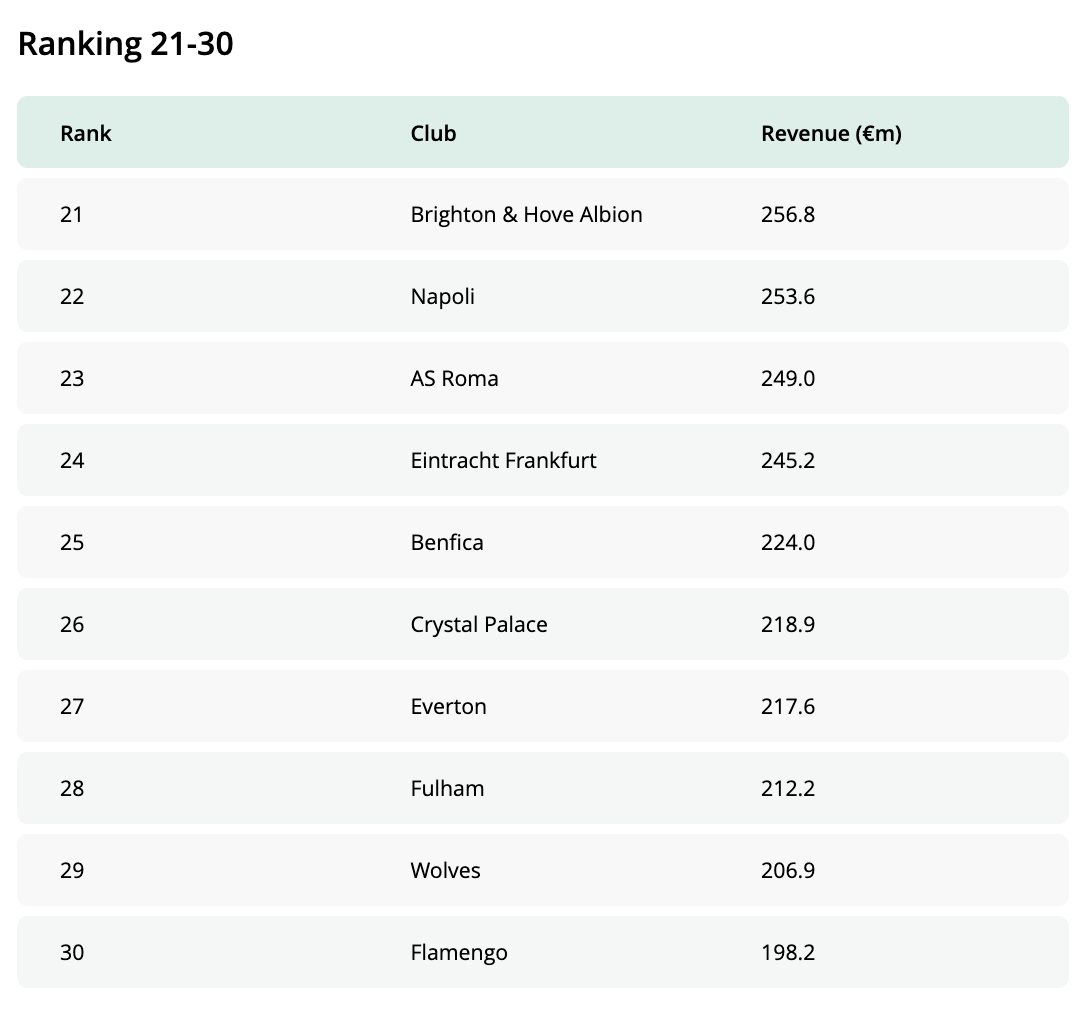TWIB: How Newcastle's owner could subsidise Chelsea and City for 2 financial years
Sancho's break fee, No 115 decision and no transfers from 10-16 June
Derided Infantino has delivered his promised riches for the Club World Cup. To Europe.
The story: FIFA has announced the prize money and associated structure on offer for the inaugural 32-team Club World Cup being held in the US from 14 June to 13 July 2025. The winners could earn up to $125m. The reality is that that winner’s pot is likely to be won by one of the 12 European teams and, most likely, by one of a handful of those clubs.
Comment: The European clubs have successfully negotiated a heavily weighted participation pillar ($525m). Of this, Europe’s 12 competing clubs will receive $306m (58%). FIFA has not yet broken down who on the European list will get what but we can make some educated guesses.
City and Real look very likely to receive over $35m each just for turning up. Bayern, PSG and Chelsea will not be far behind (if at all). FC Salzburg will only receive a third of that ($12.8m). But even this will be roughly 4x the Oceania qualifier (Auckland $3.58m) and more than all of the non-South American qualifiers ($9.6m).

But the real prize comes from the knock out phase and the sporting performance pillar. Most of the European teams will expect to win 2 from 3 in their groups and to qualify for the Round of 16 (top 2 in each group). 2 wins are worth $4m and would also likely guarantee the $7.5m R16 revenue. There are 48 group games equating to $96m of the $475m in the sporting pillar. $379m will, therefore, go to the knock-out prize money. It is likely that at least five Quarter Finalists will be European adding another $13.125m each.
So, the top European sides are near guaranteed revenue of $40-50m. Indeed, of the $475m sporting pillar, we can surely expect Europe to capture the vast majority - quite possibly over $400m and $700m across the two pillars. That’s $700m across 12 teams.
These are serious amounts for all clubs but for Benfica, Porto and FC Salzburg, these are potentially transformational revenues representing around 25% of annual turnover for Benfica and Porto and much more for Salzburg. None of these clubs are even in the Deloitte Top 20 by revenue. Porto and FC Salzburg aren’t even in the Top 30.
For Porto and Benfica, they could realistically earn more from this Club World Cup than the entire revenue of every other club in Primeira Liga except for Sporting. Remember, this is a league where 10 of the 18 clubs generate less than €8m total revenue and over 83% of the total €615m total revenue comes from just 4 teams - Benfica, Porto, Sporting and Braga.
Few of the Austrian clubs publish their accounts so we have limited public information. But the league is minor on any measure. It is 14th by revenue in UEFA’s recently published analysis. Total revenue of all Austrian Bundesliga clubs is €271m which is similar to Brighton’s (€256m).
Don’t forget the costs
Most commentary forgets the costs for the clubs. Martyn Hawkins doesn’t in his piece here. These will include:
Travel and accommodation - 5 star resorts, food, training facilities and flights, for say, a minimum of 50-60 football staff plus catering, communications personnel and senior executives are more expensive than most people estimate. And this could go on for up to 4 weeks. Some clubs will have paid non-refundable deposits for rooms in resorts for the knock out phases.
Bonuses - you can be assured that player representatives are speaking to clubs right now. Many contracts will not have specific provision for Club World Cup bonuses or provide for the old style tournament. The players are aware that they are being asked to risk further impact on their bodies and that the clubs are generating the amounts detailed above. On the club’s part there is a real purpose to incentivisation. If you can motivate the players with big bonuses to get to the Quarters and Semis, this has real upside. Without cash incentivisation, is the tournament really prestigious enough for the players?
Contract extensions - most contracts in football expire on 30 June. City, in particular, have some big players whose contracts expire on 30 June - Kevin de Bruyne in particular. What are City going to pay him to extend into July, if necessary?
For a like for like comparison with other tournaments it is also important to remember that this one has no matchday revenue for the clubs - all of that is going to FIFA and the venues. If these games really sell out at these ticket prices, some of these games could gross more than $10m.
Big thanks to Newcastle, I mean PIF
The Club World Cup prize money is part of a record-breaking $1bn pool dedicated to the tournament largely funded by DAZN’s extraordinary TV deal. DAZN in turn recently raised the cash required from Newcastle owner, PIF via a 10% minority investment valuing DAZN at an extraordinary level for such a heavily loss making media company.
The irony of Newcastle’s owner indirectly funding two of the teams they are desperate to displace whilst the club they own simultaneously struggles with PSR compliance will not be lost on fans. It may be less painful if Newcastle do make the Top 5 before the tournament even kicks off. It appears to confirm that Newcastle are just one of many business and sporting interests that PIF have involvement in even if that leads to conflicts.
Importantly, given Chelsea’s lack of Champions League and front of shirt sponsor in the current financial year, the guaranteed nature of a participation fee and the games to be held before 30 June should allow them to account for around $50m in its 2024/25 accounts. By moving their accounting reference date to 31 July, they could capture even more if needed for PSR. Otherwise, the rest of the sporting performance pillar will be recognised in the 25/26 accounts. If there was a decision on 115 between now and the Summer that meant financial compliance in 2025/26 just got much harder, City may argue with its auditors to recognise most of their Club World Cup revenue in 25/26.
M&A style break fees come to transfers
The story: Jadon Sancho's loan agreement from Manchester United to Chelsea includes an obligation for Chelsea to purchase him permanently for £25m, contingent upon finishing above 14th in the Premier League. This week, confirmation came that there is also a clause allowing Chelsea to opt out by paying Manchester United a £5m fee.
In mergers and acquisitions, a "break fee" is a penalty paid by the party that withdraws from a deal, compensating the other party for the time and resources invested in the worst case scenario (typically from regulatory issues). Similarly, the £5m clause in Sancho's loan deal serves as a break fee, permitting Chelsea to terminate their purchase obligation while compensating Manchester United.
Comment: Sancho turned 25 this week, a birthday ruined by various briefings out of Chelsea. On 10 March 2025, Sir Jim Ratcliffe confirmed: “For Sancho, who now plays for Chelsea and we pay half his wages, we're paying £17m to buy him in the summer.”
Fans celebrating paying a £5m break fee not to sign a player is a new low in the game and in football business. For United, it is a nightmare. United have paid half of Sancho’s £200k per week plus wages this season at a cost of at least £5m. We know no loan fee was payable. To have ended up effectively gifting Chelsea a free option on the player with a full season to try him out seems incredibly naive. For Chelsea, the break fee allows them full flexibility. They can further assess the player, give him back or even flip him. Dortmund are said to be sniffing and will see an opportunity to re-sign the player for less than £20m, if he is not wanted by Chelsea. Sancho may need to take a big wage cut (no, I don’t believe he took a meaningful one to go to Chelsea) to go back to Dortmund but it surely has come to that unless he is prepared to move to Saudi at 25.
Shorts
Summer window SLAMMED SHUT for six days in June - the pre-Club World Cup transfer window extension will open on 1 June only to then close on 10 June before re-opening on 16 June. FIFA rules stipulate that the transfer window can be open for a maximum of 16 weeks a year. The January window takes up 4 weeks so the maximum Summer window is 12 weeks. The 1-10 June window does not count towards the 16-week limit as it's a special window mandated by the FIFA Council but FIFA didn’t waive the overall 16-week limit. Clubs had discussed closing the window earlier on 14 August at a previous shareholders' meeting but decided to align with the other European leagues and stick with 1 September.
International weeks come and go with no 115 City decision - no White Smoke, no distant drum beats, few rumours. If not these 2 weeks then when? Are the Premier League really going to allow the finale of a season to be disrupted? Yes, it seems they are or have no choice. Ongoing self-sabotage?
2023/24 accounts due by 31 March 2025 - A number of notable teams, who were said to be close to PSR breaches for the year ended 30 June 2024, are still to file their accounts at Companies House causing a knock on impending log jam at Swiss Ramble’s house. Chelsea, Everton, Forest, Villa and Leicester will all have some interesting disclosures, particularly in the notes. Highlights will include Chelsea’s final hotel “sale” price, details of the Women’s “sale” and what other asset sales Chelsea undertook before 30 June. We may also see disclosures relating to an on-going appeal by the Premier League in respect of Leicester and potential UEFA fines for Aston Villa.








